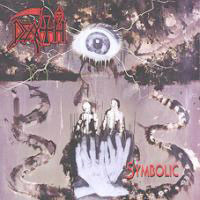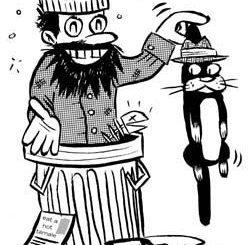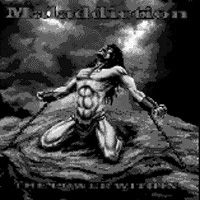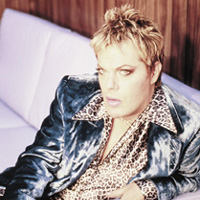 Eddie Izzard
Eddie Izzard
An interview with Eddie Izzard
by Scott Hefflon
I didn’t realize that the Dress to Kill special on HBO that Anti/Epitaph just released was recorded back in ’98.
And it’s my fifth show as well. I did another one in ’00, Circle, but it hasn’t come out yet. I own them, so I put them out when I want to, and sometimes that’s not immediately, to say the least. That’ll come out in Britain this year, and America probably soon after. Dress to Kill was shot and released in the UK in ’98, was shown on HBO in ’99, and it got two Emmys in 2000.
Is this your first DVD release?
Yes, and it’s my first release in America. I turned down other offers because I wanted to continue to own the thing. I own the copyrights, and I didn’t want to just throw that away. The suits always want to own it.
So even though it aired repeatedly on HBO, you own Dress to Kill?
It was my show, I filmed it. HBO said they wanted to do a special, and I said I’d already filmed one, and keep in mind, this was my fifth filmed show…
You hooked up with an interesting company, a record label…
A punk record label, yes. They have Tom Waits as well, an old colleague of mine. We both worked on Mystery Men. Anti hadn’t done comedy DVDs before, so I’m taking a calculated risk, but I wanted to try it out. We’ll see where we get to as time goes on, but it seems like a good place to be.
You’re really kind of a control freak, huh?
Yeah, but so were Chaplin, Lucile Ball, and various others. Comedy and music are similar in that way, unlike films, where it’s very difficult to retain control. I did accounting at university as well, so I’m not stupid. If the suits always want to own the copyrights, then duh, maybe the copyrights are the thing to own.
Did you do the DVD extras yourself?
Yes. There’s a photo documentary on it, because we didn’t have a making-of documentary. We used music from a documentary on the Civil War, and I do commentaries over the top. Which is weird, when you think about it: Commentaries on spoken word stand-up. It seems a little self-indulgent, perhaps. There are also subtitles in French and Spanish and English.
English?
For the hard of hearing. Also, if English is someone’s second language, and I’m mumbling away at full-speed, not to mention all the slang, there are probably plenty of occasions where people’ll say “What did he say?”
 I’m actually taping this interview over my Ryan Stiles interview from a couple issue ago, and I realize you were a guest on the British Whose Line is it Anyway?
I’m actually taping this interview over my Ryan Stiles interview from a couple issue ago, and I realize you were a guest on the British Whose Line is it Anyway?
Yes, I did a couple of episodes of that, and I also did another improv show after that, one-word instead of game improv, which I actually prefer. The audience will suggest one word, and then the four of us will freestyle and go off on tangents. The trick, I find, is to lower the expectation of the audience. If they’re expecting finely-crafted comedy, that’s not what they’re going to get. But if they expect hit and miss, when you get a hit, it’s really a wow…
Do you improvise during your stand-up?
Yes, because I have a low boredom threshold. Sometimes I get a routine down perfect, but then I improvise and keep changing it, making it less perfect. And I once changed the order completely around, and I couldn’t remember what I’d already done. If you do more than one show a night, things get scrwy then too.
I didn’t realize you’ve done so much stage work. I just know your stand-up and movies.
Movies are probably where most people recognize me from. The latest thing I’ve done was The Cat’s Meow, playing Charlie Chaplin, with Kristen Dunst, and I also did All the Queen’s Men with Matt LeBlanc. As for theater, I like doing theater, but don’t like the elitist audience that go to the theater. I prefer doing films.
But of all the forms you do, film is the most constrictive for you as a performer. In stand-up or theater, you can hold a moment, or you can vary the timing night by night. In film, it takes hours to set up a shot, then you walk on, say your line, and the director yells cut.
But the beauty is, if you do it right, they edit it so tightly together, it’s then there forever. I like that it lives on, long after you do it.
They say it takes a lifetime for a band to make their first album, and then they have to follow it up a year later, hence the sophomore slump. Now that you’re on movie sets more than in the comedy clubs, do you still collect observations like you used to?
Certain subjects and themes tend to fascinate you over time, like Woody Allen returns to Manhattan and relationships many times. And more and more critical weight is put on each show. Dress to Kill may be my first release in America, but it’s my fifth overall, so I don’t have to worry about my second anymore.
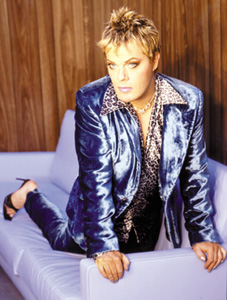 George Carlin can talk about driving in every special he does, and it’s always a new take, new jokes, a fresh look at a familiar subject.
George Carlin can talk about driving in every special he does, and it’s always a new take, new jokes, a fresh look at a familiar subject.
Like there’s no definitive way to talk about relationships. They go on, in different ways with different periods… So I continue to go on about religion and sexuality and… the universe… It’s funny, because with stand-up, you don’t really have a story… In movies, one story could be about a boy, lost in a swamp, and another is about men in outer space. Some of the themes of the stories might be the same, but the settings are vastly different. The setting in stand-up is always the same: It’s you standing on the stage.
Your interest in history could provide endless observations and anecdotes. While I may be an American, I realize there’s a lot of history to draw from.
I’m a history nut, really. My whole family is. I don’t know if there’s a history-loving gene, but if there is, we have it. My brother got an A1 in history in school, which I think you’d call an A+. I didn’t do so well at it in school, but I was fascinated. And I realized that no one was doing history in stand-up, and there’s a ton of material to laugh at, and history has a way of shedding light on the present.
Do you tailor your material depending on what country you’re in?
No, that’d be way too much work. Bands go on stage and say “Hello Cleveland,” or “Hello Detroit,” or “Hello Moscow,” and they play the same set, so I do the same thing. Actually, the Dress to Kill DVD has the show I did entirely in French on it, from when I was in Paris, with English subtitles. My secret hope is that classes teaching French will play the section of a foul-mouthed transvestite doing a gig in French. It’s called Dress to Circle, because the material is halfway between Dress to Kill and Circle.
What led you to comedy in the first place?
I’ve wanted to be an actor since I was seven, but I couldn’t get roles in any of the plays. But I always liked comedy, and I got some laughs in a class sketch show when I was 12. It felt good. While I still tried to get in the school shows – which didn’t really happen – I began writing my own material. I’d discovered Python and a few other revues.
Comedy material is more honest and vulnerable than acting out a scripted role.
If you talk about your own sad life, all the fuck-ups, people will laugh. If you talk about how great you are, it won’t work. It’s easier to be godlike in rock’n’roll or as an actor than it is as a stand-up comedian.
When did you realize you were an executive transvestite?
I knew when I was four.
I’ve seen you various places – Whose Line… and an honoring of Monty Python in Aspen – where you dress like a guy (a “bloke,” if you will). What’s the distinction or decision-making that’s involved?
Sometimes I wear make-up and sometimes I don’t. At least I have the choice now. If you come out of the straightjacket of not being able to wear it, why immediately get into the straightjacket of always having to wear it? There was a period where I got fairly established in Britain, and if I wasn’t wearing a dress, people’d ask me why I wasn’t. And I’d say “Don’t oppress me, you fascist dickhead.”
 I’ve gone to gigs in a dress and make-up, changed into trousers and taken off the make-up, done the show, then put back on the dress and make-up and left. This is not drag, I’m a transvestite. Women can wear a skirt or trousers, they can wear make-up or none, they can wear their hair long or short or wear a wig, and no one says a thing. Women can buy underwear called boy’s cut. Can you imagine a bloke buying underwear called girl’s cut?
I’ve gone to gigs in a dress and make-up, changed into trousers and taken off the make-up, done the show, then put back on the dress and make-up and left. This is not drag, I’m a transvestite. Women can wear a skirt or trousers, they can wear make-up or none, they can wear their hair long or short or wear a wig, and no one says a thing. Women can buy underwear called boy’s cut. Can you imagine a bloke buying underwear called girl’s cut?
Do you find that being a transvestite comedian distances you from the audience? That your reality is no longer theirs?
It’s okay to have your life apart from the stage, but I think there is some responsibility to be representative of the audience. You’re supposed to articulate things the audience has felt. So you can’t say “Hey, so I was in my limo the other day, and God popped in and we had martinis…” The audience will strand you. You can do it, but you have a lot of explaining to do… If you’re on Air Force One with the President and you spill coffee on the front of your trousers, people will laugh because they can connect, in a way. The Simpsons aren’t huge around the world because it’s American-style humor, it’s huge because it’s hilarious to many, many people. Aside from references, humor is human, not national.
Which is one of the reasons why Dress to Kill is as funny now as it was in ’98. Hitler was a vegetarian painter/mass-murdering fuckhead then, and he still is now.
Henry VIII jokes will never get old. It’s not like people say “Spanish Inquisition jokes? That’s so 17th Century…”
You’ve mentioned you were a big Steve Martin fan, who else really tickles you?
Monty Python, of course. I started with sketch comedy, but no one really picked up on it. And that lead to street performing, which taught me how to hold a crowd. I performed right there in Common Garden, where My Fair Lady is set. Right where Eliza sold her flowers. That’s where I learned how to talk endless crap in my own voice, not a character’s voice. Holding an audience has little to do with the quality of performance, but I learned how to do it, and that’s my ace in the hole. I know how to keep people from walking away who don’t want to see you in the first place, so when you have a room filled with people who paid to see you, it’s a lot bloody easier.
So I decided I wanted to get into nighttime stand-up, cuz that’s the place you want to be, so the street performing and sketch and improv work melded into the stand-up.
That diversity carried over to film as well: The band manager in Velvet Goldmine, a hammy actor in Shadow of the Vampire, and Mr. Disco or something in Mystery Men…
Tony T, head of the Disco Boys gang. And I played Chaplin in The Cat’s Meow and I played a bisexual transvestite in All the Queen’s Men. I also have two films coming out next year, The Revengers Tragedy, directed by Alex Cox who did Sid & Nancy, and Muraya – Expanded Reality (a.k.a. Blueberry) with Vincent Cassel, Michael Madison, and Juliette Lewis. They’re all drama but All the Queen’s Men, which is comedy against a dramatic background. All film and plays are dramatic works, and I leave the comedy for stand-up.
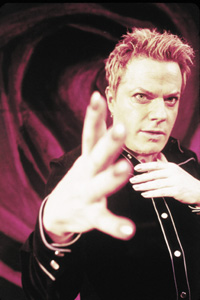 You don’t think your part in Shadow of the Vampire was funny? Your character was the comic relief, the over-acting spoiled ham…
You don’t think your part in Shadow of the Vampire was funny? Your character was the comic relief, the over-acting spoiled ham…
I wasn’t trying to be funny… If I was lighter than everyone else in the movie, it’s because I was acting alongside John Malkovich and Willem Dafoe and my character talked about food all the time.
You have a production company, do you help out up-and-coming actors or comedians?
My production company mostly helps me, really… It’s not very generous, perhaps… But the up-and-coming stand-ups in Britain don’t need the help because they get paid very well. In America, you can tour, but if you go to New York or L.A., it’s more of a showcase-type thing. There are 80 clubs in London, compared to about 10 in New York or eight in L.A., so we have a massive live comedy thing going on. Stand-ups don’t make a huge amount of money, but you can get paid decently, and if you tour and work television as well, you can do quite alright. It’s quite staggering. That’s what got me going. Sometimes I’d do up to three or four gigs a night on weekends. I’d do a set and then hop in a taxi with a bunch of money to go to the next club.
How long did you do the club circuit?
From ’88 to ’91. You can work every night of the week, and as I said, on weekends, you can do up to four shows a night. America had all the big comedy clubs, but most of them crashed at the end of the ’80s. We never got that big, and we never crashed. None of our television broadcasters liked stand-up on the Tele, so it never threatened the club scene. It’s grown steadily over the years, but never too fast, and it never craps out.
Is there any one moment that made you say “Yeah, this is why I got into this.”
There was a great time I’ll never forget when Willem Dafoe and John Malkovich and I were on a mountain, on the set of Shadow of the Vampire, and we were all just talking about what our parents said when we first told them we wanted to get into acting. We were in a castle and it was raining. I don’t remember what anyone said exactly, but it was all true…(www.eddieizzard.com)

